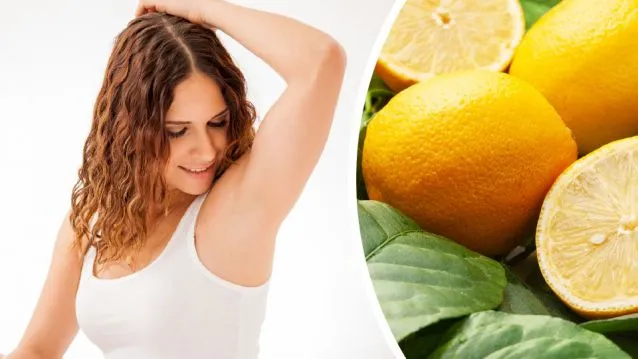No one wants to smear a product all over their pits, knowing that it is packed full of harmful additives. However, a trail of B.O. in the office isn’t the most desirable either.
For years, the public has continued to learn about the chemicals found in antiperspirants — some which have been linked to cancer. Although there are plenty of natural options on the market, some are more efficient than others. There have also been rumors circulating that a certain fruit juice can combat smelly pits, and those rumors have been confirmed by dermatologists and researchers.
Lemon juice: the truly natural deodorant
Before we dive into the power of bacteria-fighting lemon juice, it’s important that we differentiate between deodorant and antiperspirant.
- Deodorants are sold as cosmetic products and strictly work by masking or eliminating odor. These products typically utilize an antimicrobial agent or fragrance to combat odor.
- Antiperspirants are sold over-the-counter as a pharmaceutical product, containing active ingredients, such as aluminum chlorohydrate. This is what stops your pits from feeling wet and sweaty.
Now, enter lemon: a natural alternative to deodorant. Due to its astringent characteristics, it closes up your pores. This is why lemon juice is often recommended as a simple home remedy for large facial pores and blemishes.
As we all know, lemons are also highly acidic. This is what kills the bacteria brewing up a storm in your pits. Just be mindful of its acidity if you have sensitive skin, especially after you’ve shaven — ouch!
Can any research back up these claims?
As more and more people demand natural alternatives, not just for their health but for the environment, researchers are discovering the true properties of plant-based solutions.
While focusing on lemon, one key study, published in the Journal of Pharmaceutical Research and Opinion, examined the combined properties of lemon and ginger. These herbal raw materials are known to have sensory, astringent and antibacterial properties — which makes them ideal for our pits’ sweaty environment.
To prepare, the ginger juice was prepared fresh (grated and pressed) and the lemons were sliced then pressed in a juice maker. After conducting a subjective, quantitative, qualitative and microbial analysis, it was concluded that a 1:1 ratio of these juices produced a desirable effect.
It is important to note that these juices were tested both in the lab and on female subjects between the ages of 18 to 65. The combination of lemon and ginger was shown to offer good antimicrobial and astringent properties in low concentrations. The researchers stated that these ingredients would be effective when developing both deodorant and antiperspirant products.
How to use lemon in your armpits
If you want to give this a go, the process could not be simpler.
- After you have gotten out of the shower or cleaned your pits, make sure they are completely dry.
- Cut a lemon in half and gently rub it onto your armpits.
- Let your pits soak up the juice, as you’ll want the citric acid to go into your pores. This is what will stop bacteria from forming. Simply air dry your pits while you brush your teeth, wash your face or do a little dance.
- If you would like to reuse your lemon halve for the next couple of days, place it in a marked container in the fridge. After all, no one wants you making a vinaigrette with your armpit lemons.
Please note: lemon juice can act as a bleaching agent. That is why you want your pits to be dry before you get dressed. It will also make your skin more sensitive in the sun. This is what’s known as a phototoxic reaction. If you’re going to be laying on the beach with your pits out, for instance, this remedy isn’t ideal.
Body odor and diet — what’s the connection?
If you have tried natural alternatives but can’t seem to fight the smell of B.O., you should address your diet. After all, your body odor can tell you a lot about your general health.
For example, there are some conditions that can make body odor worse, such as metabolic diseases like trimethylaminuria. Stress has even been shown to cause increased body odor, but can the foods you eat really influence your B.O.?
Absolutely!
Think about it. When you sweat, your body is detoxing. As it eliminates toxins, bad odors can result. Some of the foods that influence B.O. include but are not limited to red meat, hydrogenated oils and alcohol.
At the end of the day, we are all unique. Our body odor results from a combination of bacteria. In fact, there are around 1,000 different types found in human sweat. Throw in genetic variables and lifestyle factors and you have your own unique smell.
Sweat is natural and in many ways, our desire to mask body odor is based more on social and cultural norms. Keyword, “desire” — it’s not really a necessity.
However, if your B.O. is a touch funky and you want to eliminate harsh chemicals from your life, give the ol’ lemon a squeeze!
— Krista Hillis

